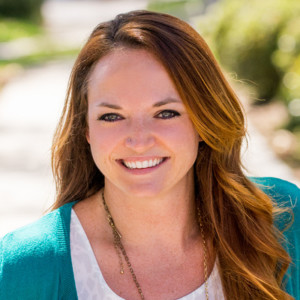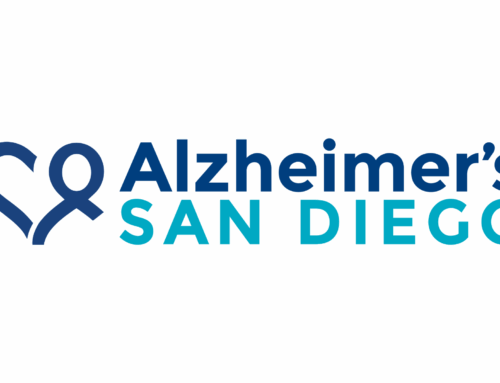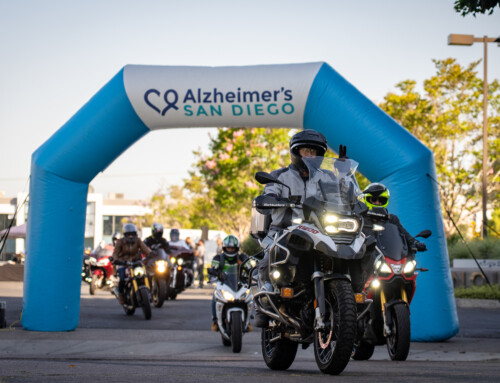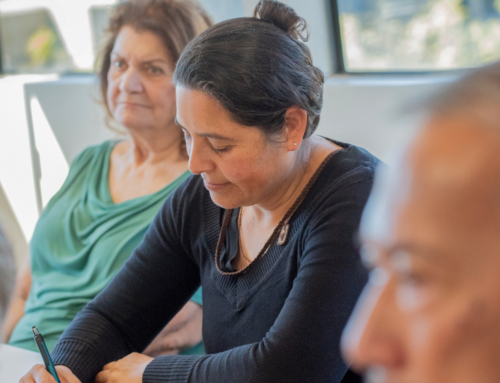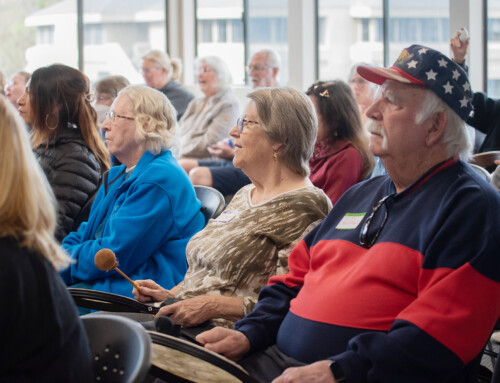Alzheimer’s San Diego is powered by a team of incredible social workers. This feature, Notes from a Social Worker, will give you a glimpse into their thoughts and feelings as they work with families impacted by dementia.
I grew up learning that laughter was the best dose of medicine to help you accept the things you can’t control. When you can no longer find anything to laugh about…you’re in big trouble. There is actually scientific proof behind that. Laughter is a natural stress and pain reliever. It helps boost your immune system and releases an abundance of endorphins, while stimulating blood circulation throughout the body. Laughter helps you live longer and get out of your own head so you can think clearly and more creatively. And – not for nothing – it also makes you more enjoyable to be around.
So often, when someone discovers that I am a social worker, their first comments are usually along the lines of:
- “I’m so sorry.”
- “Your job must be so difficult.”
- Or, “I don’t know how you do your job every day.”
I’ll let you in on a little secret – social workers laugh, cry, celebrate and we function just like you do. Laughter is actually our lifeline.
RELATED | Need support? We’re here to help!
When I went into the field of social work, I never thought I’d get so comfortable talking about the things that other people view as inappropriate or uncomfortable. Feces, incontinence and managing sexual encounters are just to name a few. We’ve heard it all! And if we haven’t, well…you just gave us our first experience.
There’s absolutely no judgement. We can all expect to grow old and become incontinent – it’s just part of normal aging. But in this line of work, if we can’t laugh through the challenges of this disease with you, then we’re going to burn out pretty quickly. Most people are embarrassed to talk about these personal matters and think that they are the only ones experiencing it. I want to make sure you know that you’re not alone.
I can remember answering the telephone one day, and before even a “Hello” I heard a woman screaming: “There’s (BLEEP) everywhere! All over the house – on my walls, in the carpet, all over my dishes!” Her husband, who had dementia, was a former artist. That day, he lovingly surprised his wife by proudly painting the inside of the house with his brown organic “paint.”
On another occasion, a former homemaker generously wanted to help her husband and decided to put the soiled laundry into the dryer on hot, hot heat before even throwing it in the washer. Needless to say…though the end result was not the most pleasant, the caregiver couldn’t help but laugh about it.
I’m not bringing these stories up to be vulgar or upsetting. I want every caregiver or person living with memory loss reading this to know: (BLEEP) HAPPENS! Literally and figuratively. And none of us have control over it. All we have control over is accepting that it is what it is. Once you get past the shock of it all, it can give you a good chuckle.
What you’re viewing as the most stressful day ever can change once you release all of those emotions into storytelling. Sharing your mortifying experiences with others can take away the shame and power of those negative feelings. That’s when you can find the space to laugh about it. It might even help you to see the beauty in the skill set people still have. Both partners in the stories I shared were trying to show love to their spouses through their actions – despite the fog created by this disease. Isn’t that an amazing and beautiful thing? We all have a desire to contribute to something and have a purpose in this life. These are great examples that while dementia may have disrupted the normal sequencing of how to paint or wash clothes, it gives them value and purpose.
RELATED | Notes from a Social Worker: Days of tears and joy
There are so many stories where those came from. There’s the time a bathing suit display in the department store triggered a person to want to join the pool party, and they began to undress publically. Can you blame the person for wanting to soak up the sun? Or what about finding 20 cartons of ice cream in the fridge and freezer because we forgot we already bought some? Returning that many items to the cashier comes with a great story!
It’s okay to laugh. It’s GOOD and HEALTHY to laugh. Can you remember the last time your stomach hurt from laughing so hard?
Sometimes, if I’m having an emotionally difficult day, I turn to the things that I know crack me up. Playing pranks on my coworkers keeps me laughing for a good chunk of the day, as does watching short episodes of “I Love Lucy” or original versions of “The Little Rascals.” It helps me to not get so caught up in all the problems that are thrown at me.
My approach may not work for everyone, but when a big part of your job is talking to people, funny things happen all the time. A woman once called to talk to me about memory loss she was experiencing. However, the moment she heard my name, we strolled down the yellow brick road of yesteryear to talk about how her cat’s great grandmother’s name was Sarina and how this animal lived through many decades and probably had coarse, thick hair just like mine. Another caller couldn’t stop telling me about how my name stems from being a mermaid and that’s where I came from…the sea, not my parents. While these conversations could have been frustrating, they truly brought me joy. I still laugh about them to this day. Sometimes, it’s a conscious choice to laugh, and it can make all the difference.
Learning to laugh at things outside of your control can take time. It can definitely be uncomfortable. But seasoned caregivers know that building a foundation of resilience must include a healthy dose of laughter and humor. Living through this disease is a long journey, and it can involve going against instinct or social norms. But if you haven’t laughed lately…find a way to change that. You’re health depends on it! No matter how hard you work to do things perfectly and check all the boxes of planning ahead – (BLEEP) HAPPENS. And it can be really messy. But at least you now know who you can call. The social workers at Alzheimer’s San Diego will listen, help you work through your frustration and laugh with you. Who knows – it might make for a great story someday.
Alzheimer’s San Diego is proud to be a local nonprofit. We’re funded by the community, for the community. Want to help one of the 84,000+ people living with dementia in San Diego County? Click here to change a life.
